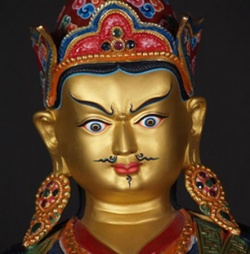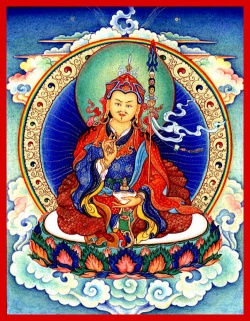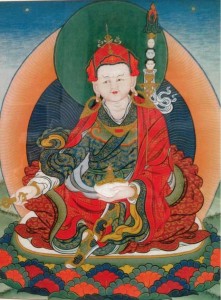Introduction to the Padma Family
It can be said that the Vajra Family's main focus is in details and that the Ratna Family is all about posessions. In a similar way, the Padma Family is about relationship.
At first we define a range of awareness or consciousness and a self image and self definition. That is the Buddha Family energy. From there, we get a sense that there is then something outside of ourselves and we move away from ourselves towards the outside world. This is the Karma Family energy. At this point, we begin to pick up the qualities of this outside world and we are drawn to different parts of it or we try to draw parts of the outside world towards us. This is Padma energy.
The passive energy of the Padma family is Appreciation. This is the first recognition of something outside of ourselves that has attractive qualities. This is the beginning of a sense of curiosity and from that comes a desire for investigation; a desire for connecting with the outside person, object, or situation. This is the active energy of Merging, joining, or Uniting. This is that magnetic principle.
Following the initial attraction between ourselves and what's outside of ourselves comes an increase of curiousity leading to a desire to join with Other and thereby learn about Other through feelings. We then get to know the details of Other through analysis in order to resolve our relationship with this portion of the outside world. So Padma energy is very much concerned with relationship; with the whole process of attraction and union. After that, Ratna and Vajra energies take over.
So Padma family involves the Perceptions Collection. The first aspect of noticing the qualities of portions of our world outside. From there, it develops an intensity which comes from the desire to merge with that portion of the outside world or to attract it towards us.
The Padma element of Fire also reflects that intensity and heat. In order to perceive something, we need to draw it towards us, and the Fire element is associated with that attractive, magnetizing energy. It also has qualities of consuming as it burns outside components as fuel.
The body part is the throat and vocal chords. Communication plays a large role in attracting Other to us and in relating and interchanging with the outside world. This is true in terms of speech and ingesting food and drink as well as with breathing.
With Padma Wisdom, we appreciate the qualities, kindnesses and benefits of others and are therefore more compelled to work for their benefit and feel grateful for their existence and therefore Compassion and Loving Kindness automatically arises from this energy. The initial appreciation of the qualities of the outside world leads to curiousity and a desire to know and assimilate that aspect of the outside world and so Investigation is the wisdom of the Padma family.
When we grasp at or are carried away by Padma energy, we can use this attraction for our own selfish purposes. The result is that we can become manipulative and use and enhance our charisma in order to satisfy our self-interests. On the other side, if we feel a missing of relationship or attraction and grasp at that, we can become obsessive, sentimental, and full of longing.
When we try to resist the Padma energy, we can become demanding and try to control the situation so that no room is left for the other person to participate in the relationship. The other side is that we can become cold, bitter and uncommunicative. We can also become spiteful and bitter because the relationship we are working on is not going according to our expectations.
Being overwhelmed by Padma energy, we will become depressed and sad or full of longing and emotionality. We get caught between the need for relationship and our inability to work with the reality of exchange that must occur in these relationships. We can also be overwhelmed by the intensity of the emotions or the vulnerability involved in the processes of attraction and union with others.
In order to deal with the attraction towards others that is part of the Padma energy, we need to develop Morality, and Compassion. If we look carefully at the process of longing and satisfaction, we can begin to see that, if we allow ourselves to satisfy our desires at all costs, we end up harming others and ultimately ourselves. Morality ensures that our relationship with others does not deteriorate into selfishness which ends up causing harm for ourselves as well as those we relate with. Developing respect and sensitivity towards others allows us to have a relationship with the outside world that contributes to our own and others ultimate peace and joy. Awakening to this fact is part of Buddhahood.
Padma is associated with Summer, with heat and maturity. The colour associated with it is the red of intensity and fire. This is also a reflection of the process of consumption.
The Buddha associated with the Padma family is Amitabha, Infinite Light. He can also appear as Amitayus, Infinite Life. He represents purified perceptions and Investigative Wisdom. His consort is Pandaravasini, who represents the purified Fire Element. The Bodhisattvas of Compassion, Avalokiteshvara (Chenrezi in Tibetan) and White Tara belong to this family. The Bodhisattva of Wisdom, Manjushri, also belongs to the Padma family.
Because this is the Age of Desire, there is a very strong relationship and it is easy for Buddhist Practitioners of this age to create connections with and get benefits from practices that are related to Amitabha, Avalokiteshvara, Tara, and Manjushri.
Because it is the age of desire, then longing and desire form a large part of our social environment. This is the age of consumption and consumerism. It is also the age of seduction and manipulation.
However, unlike other teachings that focus on eliminating harmful mind-states and cultivating beneficial mind-states, the teachings of the 5 Wisdom Families say that the energy behind the negative minds that we create and follow, is the same as the energy behind the postive ones. In this teaching it is not about what we do that is mistaken, but it's about how we express this energy that is misunderstood. Therefore, just as Anger and Fear can be converted to intelligence, through patience, and just as Pride and Attachment can be converted to Balance and Equality through Generosity, then longing and manipulation can be converted into Investigative Wisdom and Compassion through the practice of Morality.
The remainder of the lessons on the Padma Family will be going into detail about all aspects of this process.


